Yiran Qiao
Live or Lie: Action-Aware Capsule Multiple Instance Learning for Risk Assessment in Live Streaming Platforms
Feb 03, 2026Abstract:Live streaming has become a cornerstone of today's internet, enabling massive real-time social interactions. However, it faces severe risks arising from sparse, coordinated malicious behaviors among multiple participants, which are often concealed within normal activities and challenging to detect timely and accurately. In this work, we provide a pioneering study on risk assessment in live streaming rooms, characterized by weak supervision where only room-level labels are available. We formulate the task as a Multiple Instance Learning (MIL) problem, treating each room as a bag and defining structured user-timeslot capsules as instances. These capsules represent subsequences of user actions within specific time windows, encapsulating localized behavioral patterns. Based on this formulation, we propose AC-MIL, an Action-aware Capsule MIL framework that models both individual behaviors and group-level coordination patterns. AC-MIL captures multi-granular semantics and behavioral cues through a serial and parallel architecture that jointly encodes temporal dynamics and cross-user dependencies. These signals are integrated for robust room-level risk prediction, while also offering interpretable evidence at the behavior segment level. Extensive experiments on large-scale industrial datasets from Douyin demonstrate that AC-MIL significantly outperforms MIL and sequential baselines, establishing new state-of-the-art performance in room-level risk assessment for live streaming. Moreover, AC-MIL provides capsule-level interpretability, enabling identification of risky behavior segments as actionable evidence for intervention. The project page is available at: https://qiaoyran.github.io/AC-MIL/.
Deja Vu in Plots: Leveraging Cross-Session Evidence with Retrieval-Augmented LLMs for Live Streaming Risk Assessment
Jan 22, 2026Abstract:The rise of live streaming has transformed online interaction, enabling massive real-time engagement but also exposing platforms to complex risks such as scams and coordinated malicious behaviors. Detecting these risks is challenging because harmful actions often accumulate gradually and recur across seemingly unrelated streams. To address this, we propose CS-VAR (Cross-Session Evidence-Aware Retrieval-Augmented Detector) for live streaming risk assessment. In CS-VAR, a lightweight, domain-specific model performs fast session-level risk inference, guided during training by a Large Language Model (LLM) that reasons over retrieved cross-session behavioral evidence and transfers its local-to-global insights to the small model. This design enables the small model to recognize recurring patterns across streams, perform structured risk assessment, and maintain efficiency for real-time deployment. Extensive offline experiments on large-scale industrial datasets, combined with online validation, demonstrate the state-of-the-art performance of CS-VAR. Furthermore, CS-VAR provides interpretable, localized signals that effectively empower real-world moderation for live streaming.
When 'YES' Meets 'BUT': Can Large Models Comprehend Contradictory Humor Through Comparative Reasoning?
Mar 29, 2025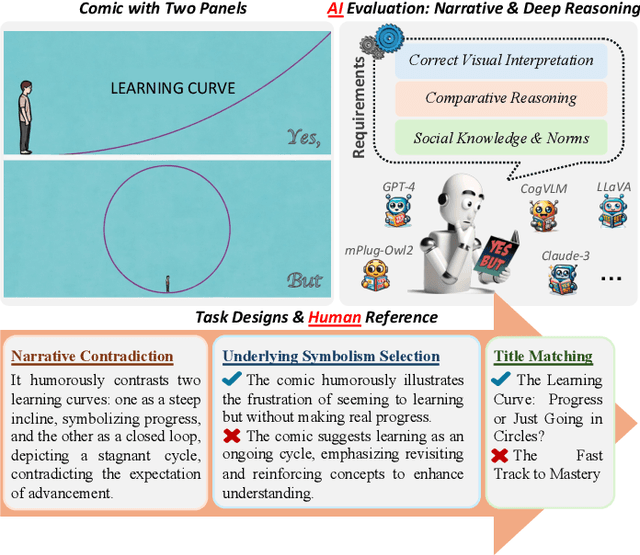

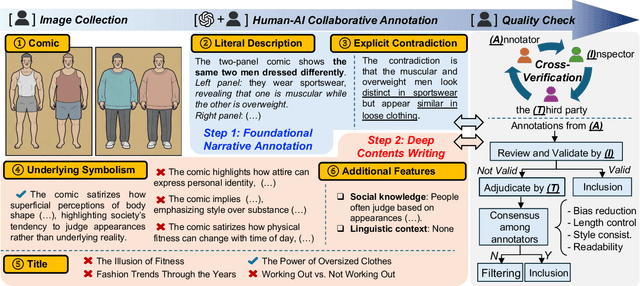

Abstract:Understanding humor-particularly when it involves complex, contradictory narratives that require comparative reasoning-remains a significant challenge for large vision-language models (VLMs). This limitation hinders AI's ability to engage in human-like reasoning and cultural expression. In this paper, we investigate this challenge through an in-depth analysis of comics that juxtapose panels to create humor through contradictions. We introduce the YesBut (V2), a novel benchmark with 1,262 comic images from diverse multilingual and multicultural contexts, featuring comprehensive annotations that capture various aspects of narrative understanding. Using this benchmark, we systematically evaluate a wide range of VLMs through four complementary tasks spanning from surface content comprehension to deep narrative reasoning, with particular emphasis on comparative reasoning between contradictory elements. Our extensive experiments reveal that even the most advanced models significantly underperform compared to humans, with common failures in visual perception, key element identification, comparative analysis and hallucinations. We further investigate text-based training strategies and social knowledge augmentation methods to enhance model performance. Our findings not only highlight critical weaknesses in VLMs' understanding of cultural and creative expressions but also provide pathways toward developing context-aware models capable of deeper narrative understanding though comparative reasoning.
Segment then Splat: A Unified Approach for 3D Open-Vocabulary Segmentation based on Gaussian Splatting
Mar 28, 2025Abstract:Open-vocabulary querying in 3D space is crucial for enabling more intelligent perception in applications such as robotics, autonomous systems, and augmented reality. However, most existing methods rely on 2D pixel-level parsing, leading to multi-view inconsistencies and poor 3D object retrieval. Moreover, they are limited to static scenes and struggle with dynamic scenes due to the complexities of motion modeling. In this paper, we propose Segment then Splat, a 3D-aware open vocabulary segmentation approach for both static and dynamic scenes based on Gaussian Splatting. Segment then Splat reverses the long established approach of "segmentation after reconstruction" by dividing Gaussians into distinct object sets before reconstruction. Once the reconstruction is complete, the scene is naturally segmented into individual objects, achieving true 3D segmentation. This approach not only eliminates Gaussian-object misalignment issues in dynamic scenes but also accelerates the optimization process, as it eliminates the need for learning a separate language field. After optimization, a CLIP embedding is assigned to each object to enable open-vocabulary querying. Extensive experiments on various datasets demonstrate the effectiveness of our proposed method in both static and dynamic scenarios.
CAUSAL3D: A Comprehensive Benchmark for Causal Learning from Visual Data
Mar 06, 2025Abstract:True intelligence hinges on the ability to uncover and leverage hidden causal relations. Despite significant progress in AI and computer vision (CV), there remains a lack of benchmarks for assessing models' abilities to infer latent causality from complex visual data. In this paper, we introduce \textsc{\textbf{Causal3D}}, a novel and comprehensive benchmark that integrates structured data (tables) with corresponding visual representations (images) to evaluate causal reasoning. Designed within a systematic framework, Causal3D comprises 19 3D-scene datasets capturing diverse causal relations, views, and backgrounds, enabling evaluations across scenes of varying complexity. We assess multiple state-of-the-art methods, including classical causal discovery, causal representation learning, and large/vision-language models (LLMs/VLMs). Our experiments show that as causal structures grow more complex without prior knowledge, performance declines significantly, highlighting the challenges even advanced methods face in complex causal scenarios. Causal3D serves as a vital resource for advancing causal reasoning in CV and fostering trustworthy AI in critical domains.
SAIF: A Sparse Autoencoder Framework for Interpreting and Steering Instruction Following of Language Models
Feb 17, 2025Abstract:The ability of large language models (LLMs) to follow instructions is crucial for their practical applications, yet the underlying mechanisms remain poorly understood. This paper presents a novel framework that leverages sparse autoencoders (SAE) to interpret how instruction following works in these models. We demonstrate how the features we identify can effectively steer model outputs to align with given instructions. Through analysis of SAE latent activations, we identify specific latents responsible for instruction following behavior. Our findings reveal that instruction following capabilities are encoded by a distinct set of instruction-relevant SAE latents. These latents both show semantic proximity to relevant instructions and demonstrate causal effects on model behavior. Our research highlights several crucial factors for achieving effective steering performance: precise feature identification, the role of final layer, and optimal instruction positioning. Additionally, we demonstrate that our methodology scales effectively across SAEs and LLMs of varying sizes.
Financial Risk Assessment via Long-term Payment Behavior Sequence Folding
Nov 22, 2024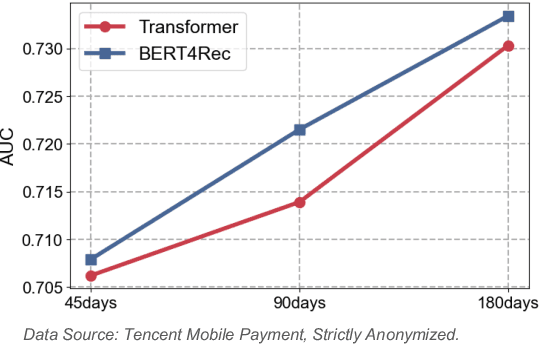
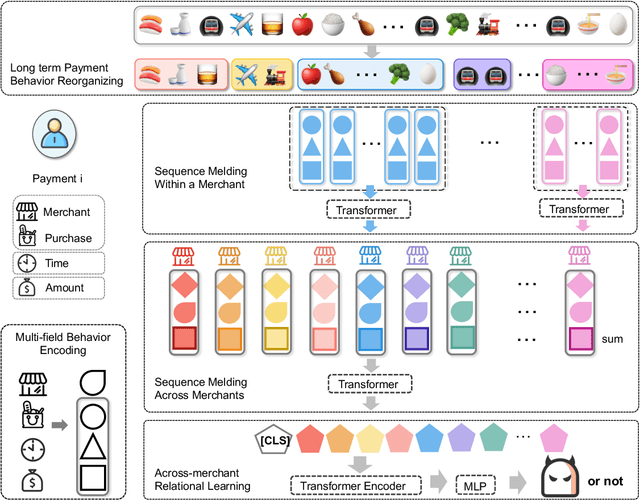
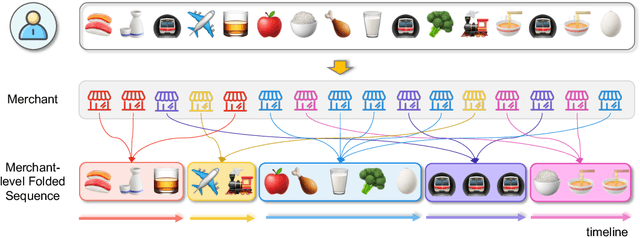
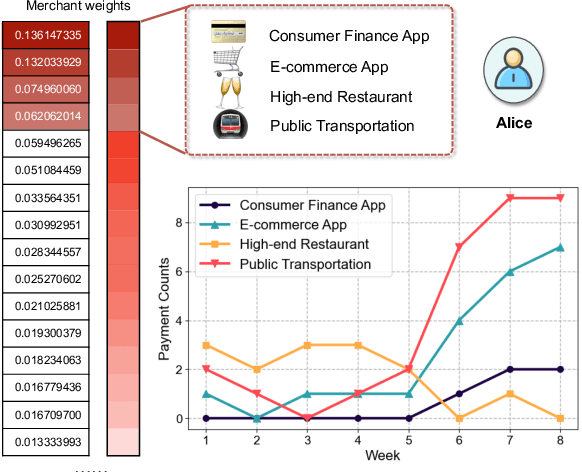
Abstract:Online inclusive financial services encounter significant financial risks due to their expansive user base and low default costs. By real-world practice, we reveal that utilizing longer-term user payment behaviors can enhance models' ability to forecast financial risks. However, learning long behavior sequences is non-trivial for deep sequential models. Additionally, the diverse fields of payment behaviors carry rich information, requiring thorough exploitation. These factors collectively complicate the task of long-term user behavior modeling. To tackle these challenges, we propose a Long-term Payment Behavior Sequence Folding method, referred to as LBSF. In LBSF, payment behavior sequences are folded based on merchants, using the merchant field as an intrinsic grouping criterion, which enables informative parallelism without reliance on external knowledge. Meanwhile, we maximize the utility of payment details through a multi-field behavior encoding mechanism. Subsequently, behavior aggregation at the merchant level followed by relational learning across merchants facilitates comprehensive user financial representation. We evaluate LBSF on the financial risk assessment task using a large-scale real-world dataset. The results demonstrate that folding long behavior sequences based on internal behavioral cues effectively models long-term patterns and changes, thereby generating more accurate user financial profiles for practical applications.
Certified Causal Defense with Generalizable Robustness
Aug 28, 2024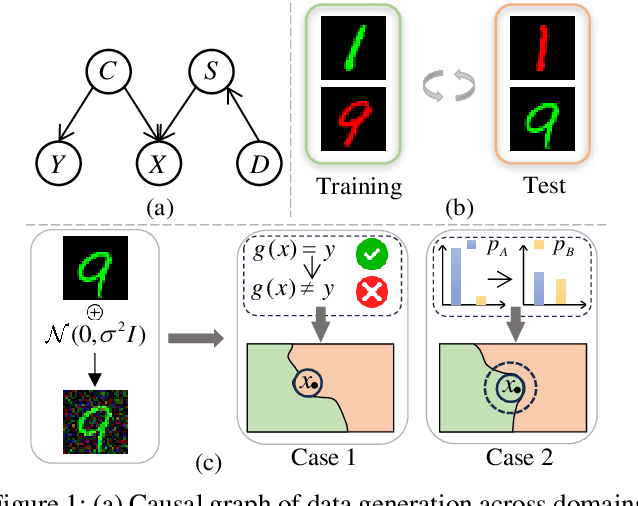



Abstract:While machine learning models have proven effective across various scenarios, it is widely acknowledged that many models are vulnerable to adversarial attacks. Recently, there have emerged numerous efforts in adversarial defense. Among them, certified defense is well known for its theoretical guarantees against arbitrary adversarial perturbations on input within a certain range (e.g., $l_2$ ball). However, most existing works in this line struggle to generalize their certified robustness in other data domains with distribution shifts. This issue is rooted in the difficulty of eliminating the negative impact of spurious correlations on robustness in different domains. To address this problem, in this work, we propose a novel certified defense framework GLEAN, which incorporates a causal perspective into the generalization problem in certified defense. More specifically, our framework integrates a certifiable causal factor learning component to disentangle the causal relations and spurious correlations between input and label, and thereby exclude the negative effect of spurious correlations on defense. On top of that, we design a causally certified defense strategy to handle adversarial attacks on latent causal factors. In this way, our framework is not only robust against malicious noises on data in the training distribution but also can generalize its robustness across domains with distribution shifts. Extensive experiments on benchmark datasets validate the superiority of our framework in certified robustness generalization in different data domains. Code is available in the supplementary materials.
Cracking the Code of Juxtaposition: Can AI Models Understand the Humorous Contradictions
May 29, 2024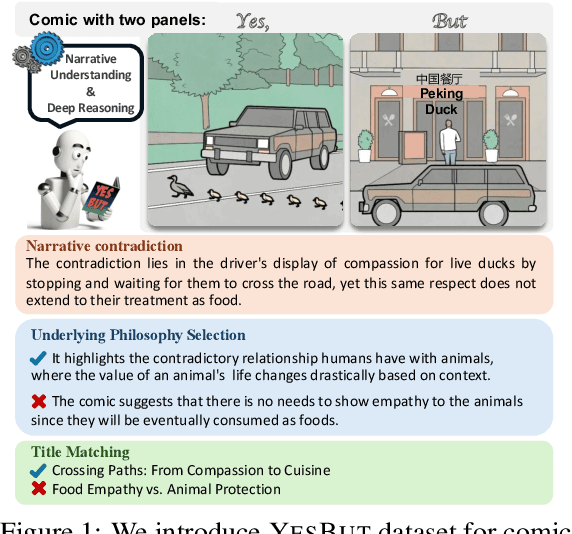
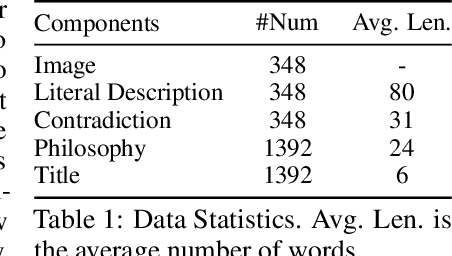
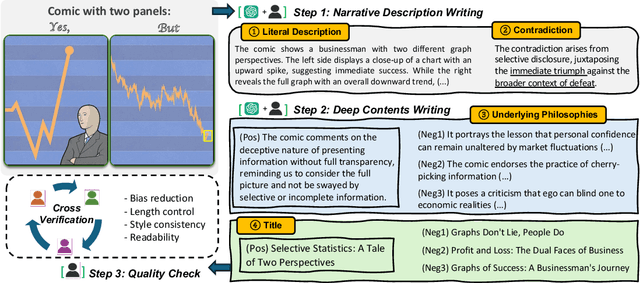
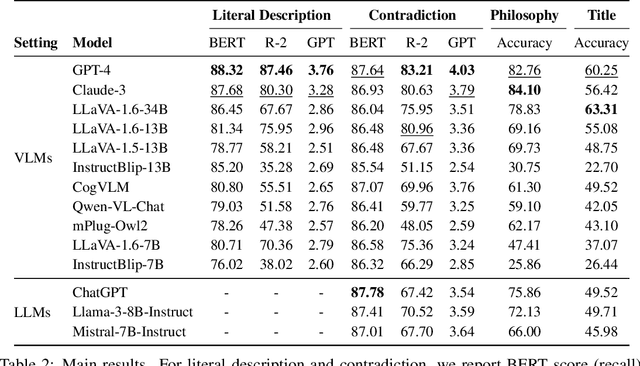
Abstract:Recent advancements in large multimodal language models have demonstrated remarkable proficiency across a wide range of tasks. Yet, these models still struggle with understanding the nuances of human humor through juxtaposition, particularly when it involves nonlinear narratives that underpin many jokes and humor cues. This paper investigates this challenge by focusing on comics with contradictory narratives, where each comic consists of two panels that create a humorous contradiction. We introduce the YesBut benchmark, which comprises tasks of varying difficulty aimed at assessing AI's capabilities in recognizing and interpreting these comics, ranging from literal content comprehension to deep narrative reasoning. Through extensive experimentation and analysis of recent commercial or open-sourced large (vision) language models, we assess their capability to comprehend the complex interplay of the narrative humor inherent in these comics. Our results show that even state-of-the-art models still lag behind human performance on this task. Our findings offer insights into the current limitations and potential improvements for AI in understanding human creative expressions.
LOGIN: A Large Language Model Consulted Graph Neural Network Training Framework
May 22, 2024



Abstract:Recent prevailing works on graph machine learning typically follow a similar methodology that involves designing advanced variants of graph neural networks (GNNs) to maintain the superior performance of GNNs on different graphs. In this paper, we aim to streamline the GNN design process and leverage the advantages of Large Language Models (LLMs) to improve the performance of GNNs on downstream tasks. We formulate a new paradigm, coined "LLMs-as-Consultants," which integrates LLMs with GNNs in an interactive manner. A framework named LOGIN (LLM Consulted GNN training) is instantiated, empowering the interactive utilization of LLMs within the GNN training process. First, we attentively craft concise prompts for spotted nodes, carrying comprehensive semantic and topological information, and serving as input to LLMs. Second, we refine GNNs by devising a complementary coping mechanism that utilizes the responses from LLMs, depending on their correctness. We empirically evaluate the effectiveness of LOGIN on node classification tasks across both homophilic and heterophilic graphs. The results illustrate that even basic GNN architectures, when employed within the proposed LLMs-as-Consultants paradigm, can achieve comparable performance to advanced GNNs with intricate designs. Our codes are available at https://github.com/QiaoYRan/LOGIN.
 Add to Chrome
Add to Chrome Add to Firefox
Add to Firefox Add to Edge
Add to Edge